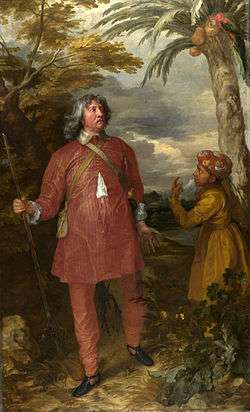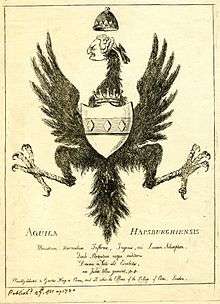William Feilding, 1st Earl of Denbigh

William Feilding, 1st Earl of Denbigh (c. 1587 – 8 April 1643, Cannock[1]) was an English naval officer and courtier.
Biography

William Feilding was the son of Basil Fielding of Newnham Paddox in Warwickshire, (High Sheriff of Warwickshire in 1612), and of Elizabeth, daughter of Sir Walter Aston (1530–1599) and his wife, Elizabeth (née Leveson).[2][3][lower-alpha 1]
Feilding matriculated at Queens' College, Cambridge in 1603.[5] Knighted on 4 March 1607,[1] he was created Baron and Viscount Feilding in 1620. Two years later he was appointed Master of the Great Wardrobe and Custos Rotulorum of Warwickshire and Earl of Denbigh on 14 September 1622.,[1][2] He attended Prince Charles on the Spanish adventure, served as Admiral in the unsuccessful Cadiz Expedition in 1625, and commanded the disastrous attempt upon Rochelle in 1628, becoming the same year a member of the Council of war, and in 1633 a Member of the Council of Wales and the Marches. In 1631, Lord Denbigh visited the East[2] as erstwhile ambassador to the court of Safi of Persia as well as toured the East India Company's fledgling Indian possessions.[6]
On the outbreak of the English Civil War he served under Prince Rupert of the Rhine and was present at the Battle of Edgehill. On 3 April 1643 during Rupert's attack on Birmingham he was wounded and died from the effects on the 8th, being buried at Monks Kirby in Warwickshire. His courage, unselfishness and devotion to duty are much praised by the Edward Hyde, Earl of Clarendon.[2]
Family
In 1606 Feilding married Susan, daughter of Sir George Villiers, sister of the future Duke of Buckingham, and on the rise of Buckingham received various offices and dignities. Sir William and his wife Susan Villiers had six children:
- Basil Feilding, 2nd Earl of Denbigh[7][8] (ca. 1608–1675)
- George Feilding, 1st Earl of Desmond[8] (ca. 1614–1665)
- Mary (1613–1638), married James Hamilton, 1st Duke of Hamilton.[7][8][lower-alpha 2]
- Lady Anne (died 1636), married Baptist Noel, 3rd Viscount Campden[7][8]
- Lady Elizabeth, Countess of Guildford (died 1667), married Lewis Boyle, 1st Viscount Boyle.[8]
- Henrietta Marie (died young)[8]
His daughter, Lady Margaret Feilding (1613–1638), also known as Mary, was married to James Hamilton, 1st Duke of Hamilton, one of the heirs to the throne of Scotland after the descendants of James VI (James I of England). Her portrait was painted by Anthony van Dyck and Henry Pierce Bone. One of his two sons, George Feilding, was the 1st Earl of Desmond.
Ancestry
| Ancestors of William Feilding, 1st Earl of Denbigh | |||||||||||||||||||||||||||||||||||||||||||||||||||||||||||||||||||||||||||||||||||||||||||||||||||||||||||||||||||||||||||||||||||||||||||||||||||||||||||||||||||||||||||||||||||||||||||||||||||||||||||||||||||||||||||||||||||||||||||||||||||||||||||||||||||||||||||||||||||||||||||||||||||||||||||||||||||||||||||||||||||||||||||||||||||||||||||||||||||||||||||||||||||||||||||||||||||||||||||||||||||||||||||||||||||||||||||||||||||||||||||||||||||||||||||
|---|---|---|---|---|---|---|---|---|---|---|---|---|---|---|---|---|---|---|---|---|---|---|---|---|---|---|---|---|---|---|---|---|---|---|---|---|---|---|---|---|---|---|---|---|---|---|---|---|---|---|---|---|---|---|---|---|---|---|---|---|---|---|---|---|---|---|---|---|---|---|---|---|---|---|---|---|---|---|---|---|---|---|---|---|---|---|---|---|---|---|---|---|---|---|---|---|---|---|---|---|---|---|---|---|---|---|---|---|---|---|---|---|---|---|---|---|---|---|---|---|---|---|---|---|---|---|---|---|---|---|---|---|---|---|---|---|---|---|---|---|---|---|---|---|---|---|---|---|---|---|---|---|---|---|---|---|---|---|---|---|---|---|---|---|---|---|---|---|---|---|---|---|---|---|---|---|---|---|---|---|---|---|---|---|---|---|---|---|---|---|---|---|---|---|---|---|---|---|---|---|---|---|---|---|---|---|---|---|---|---|---|---|---|---|---|---|---|---|---|---|---|---|---|---|---|---|---|---|---|---|---|---|---|---|---|---|---|---|---|---|---|---|---|---|---|---|---|---|---|---|---|---|---|---|---|---|---|---|---|---|---|---|---|---|---|---|---|---|---|---|---|---|---|---|---|---|---|---|---|---|---|---|---|---|---|---|---|---|---|---|---|---|---|---|---|---|---|---|---|---|---|---|---|---|---|---|---|---|---|---|---|---|---|---|---|---|---|---|---|---|---|---|---|---|---|---|---|---|---|---|---|---|---|---|---|---|---|---|---|---|---|---|---|---|---|---|---|---|---|---|---|---|---|---|---|---|---|---|---|---|---|---|---|---|---|---|---|---|---|---|---|---|---|---|---|---|---|---|---|---|---|---|---|---|---|---|---|---|---|---|---|---|---|---|---|---|---|---|---|---|---|---|---|---|---|---|---|---|---|---|---|---|---|---|---|---|---|---|---|---|---|---|---|---|---|---|---|---|---|---|---|---|---|---|---|---|---|---|---|---|---|---|---|---|---|---|---|---|---|---|---|---|---|---|---|---|---|---|---|
| |||||||||||||||||||||||||||||||||||||||||||||||||||||||||||||||||||||||||||||||||||||||||||||||||||||||||||||||||||||||||||||||||||||||||||||||||||||||||||||||||||||||||||||||||||||||||||||||||||||||||||||||||||||||||||||||||||||||||||||||||||||||||||||||||||||||||||||||||||||||||||||||||||||||||||||||||||||||||||||||||||||||||||||||||||||||||||||||||||||||||||||||||||||||||||||||||||||||||||||||||||||||||||||||||||||||||||||||||||||||||||||||||||||||||||
| Notes | |||||||||||||||||||||||||||||||||||||||||||||||||||||||||||||||||||||||||||||||||||||||||||||||||||||||||||||||||||||||||||||||||||||||||||||||||||||||||||||||||||||||||||||||||||||||||||||||||||||||||||||||||||||||||||||||||||||||||||||||||||||||||||||||||||||||||||||||||||||||||||||||||||||||||||||||||||||||||||||||||||||||||||||||||||||||||||||||||||||||||||||||||||||||||||||||||||||||||||||||||||||||||||||||||||||||||||||||||||||||||||||||||||||||||||
| |||||||||||||||||||||||||||||||||||||||||||||||||||||||||||||||||||||||||||||||||||||||||||||||||||||||||||||||||||||||||||||||||||||||||||||||||||||||||||||||||||||||||||||||||||||||||||||||||||||||||||||||||||||||||||||||||||||||||||||||||||||||||||||||||||||||||||||||||||||||||||||||||||||||||||||||||||||||||||||||||||||||||||||||||||||||||||||||||||||||||||||||||||||||||||||||||||||||||||||||||||||||||||||||||||||||||||||||||||||||||||||||||||||||||||
Notes
- ↑ The descent of the Feildings from the house of Habsburg, through the counts of Laufenburg and Rheinfelden, long considered authentic, and accepted by Edward Gibbon, has been proved to have been based on forged documents.[4]
 Satirical print of the arms of the Feilding family superimposed on the Habsburg double-headed eagle lacking one head, dedicated to the Garter King of Arms and mocking the family's pretensions at ancestral connections to the Habsburg dynasty.
Satirical print of the arms of the Feilding family superimposed on the Habsburg double-headed eagle lacking one head, dedicated to the Garter King of Arms and mocking the family's pretensions at ancestral connections to the Habsburg dynasty. - ↑ One of Mary Feilding's many descendants include the late Princess of Wales, Lady Diana Spencer.
- 1 2 3 Thrush 2008.
- 1 2 3 4 Chisholm 1911, p. 17.
- ↑ Lundy 2011, p. 10941 § 109408 cites Cokayne 2000, p. 178.
- ↑ J. H. Round, Studies in Peerage and Family History
- ↑ "Feilding, William (FLDN603W)". A Cambridge Alumni Database. University of Cambridge.
- ↑ Hedges, William (1889). Yule, Henry, ed. The diary of William Hedges, esq. (afterwards Sir William Hedges), during his agency in Bengal : as well as on his voyage out and return overland (1681-1697). 2. London: Hakuyt Society. p. cccxliv-cccxlvi.
- 1 2 3 Colburn 1880, p. 354.
- 1 2 3 4 5 6 Debrett 1836, p. 70.
References
| Wikisource has the text of the 1885–1900 Dictionary of National Biography's article about Feilding, William. |
- Colburn, Henry (1880), A Genealogical and Heraldic Dictionary of the Peerage and Baronetage of the British Empire, 42:1, p. 354
- Debrett, John (1836), Debrett's Peerage of England, Scotland, and Ireland, p. 70
- Lundy, Darryl (4 March 2011), William Feilding, 1st Earl of Denbigh, Peerage.com, p. 10941 § 109408, retrieved November 2013 Check date values in:
|access-date=(help) cites:- Cokayne, G.E. (2000), et all, eds., The Complete Peerage of England, Scotland, Ireland, Great Britain and the United Kingdom, Extant, Extinct or Dormant, IV (new reprint in 6 volumes ed.), Gloucester, U.K.: Alan Sutton Publishing, p. 178
- Thrush, Andrew (January 2008) [2004], "Feilding, William, first earl of Denbigh (c.1587–1643)", Oxford Dictionary of National Biography (online ed.), Oxford University Press, doi:10.1093/ref:odnb/9251 (Subscription or UK public library membership required.)
- Attribution
 This article incorporates text from a publication now in the public domain: Chisholm, Hugh, ed. (1911). "Denbigh, William Feilding, 1st Earl of". Encyclopædia Britannica. 8 (11th ed.). Cambridge University Press. p. 17. Endnotes:
This article incorporates text from a publication now in the public domain: Chisholm, Hugh, ed. (1911). "Denbigh, William Feilding, 1st Earl of". Encyclopædia Britannica. 8 (11th ed.). Cambridge University Press. p. 17. Endnotes:
- E. Lodge, Portraits (1850), iv. 113
- J. Nichols, History of Leicestershire (1807), iv. pt. 1, 273
- Hist. MSS. Comm Ser. 4th Rep. app. 254
- Cal. of State Papers, Dom.
- J. H. Round, Studies in Peerage and Family History,1901, p. 216.
External links
| Wikimedia Commons has media related to William Feilding, 1st Earl of Denbigh. |
| Honorary titles | ||
|---|---|---|
| Preceded by The Lord Brooke |
Custos Rotulorum of Warwickshire 1628–1643 |
Succeeded by The Lord Dunsmore |
| Peerage of England | ||
| New creation | Earl of Denbigh 1622–1643 |
Succeeded by Basil Feilding |
| Viscount Feilding 1620–1643 | ||